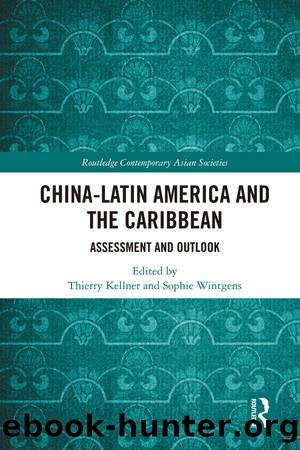China-Latin America and the Caribbean: Assessment and Outlook by Thierry Kellner & Sophie Wintgens

Author:Thierry Kellner & Sophie Wintgens [Kellner, Thierry & Wintgens, Sophie]
Language: eng
Format: epub
Tags: Political Science, International Relations, General, World, Asian, Caribbean & Latin American
ISBN: 9781000384703
Google: gJYiEAAAQBAJ
Goodreads: 55995101
Publisher: Routledge
Published: 2021-05-03T07:04:20+00:00
8
The triangular relation between China, the United States and Venezuela
Ana Soliz de Stange
Introduction
During the last decades, the growing economic and political presence of China in Venezuela has raised concerns among officials in the United States on its possible implications for the US interests. The US concerns are not inaccurate when we consider that the relationship between China, the United States and Venezuela may be characterized as âtriangularâ. Moreover, we argue that their relationship has been synchronized.1 This means that the relation between two of the countries affects the third one and vice-versa in a process of almost simultaneous responses. In this chapter, we are going to analyse the synchronization process between China, the United States and Venezuela, from 2000 to 2016.
In 2001, Jiang Zemin, President of China, visited Argentina, Chile, Cuba, Uruguay and Venezuela. At that time, nobody could have predicted the Chinese approach to Venezuela within 15 years. Venezuela would become the most important recipient of loans in Latin America2; China has become the second largest market for Venezuelan oil, and as a result, Caracas has become highly dependent on Beijing economically. In Venezuela, the Chinese advances in lending, trade and investments have been accompanied by its renewed political and diplomatic overtures.
China has deepened its political and diplomatic engagement with countries that were considered of strategic value for Chinese interests. Initially, in 2001, Venezuela and China agreed to establish a strategic partnership to commence regular cooperation in energy and agricultural exchange. China started to invest in oil production and infrastructure in Venezuela, as well as installed experimental farms to increase agriculture production. Despite their limited areas of cooperation and almost non-existent trade in 2001, they still created a high-level commission that permanently coordinates their joint projects. Venezuela was the first partner in Latin America that established a high-level bilateral commission with China, as an ad hoc diplomatic channel for communication and coordination.
Chinaâs engagement in Latin America in general, and in Venezuela in particular, revived the idea that the great power in its own region observes, with some apprehension, the presence and potential influences of an extra-regional power.3 For instance, General Bantz J. Craddock,4 and General John Kelly,5 both former Commander of the US Armyâs Southern Command, and Hillary Clinton,6 referred to the long-term goals of China in the region, looking for natural resources and political influence. Rex Tillerson,7 Secretary of State, warns about the Chinese expansion as a ânew imperial powerâ in Latin America. Moreover, Mike Pompeo, Secretary of State, expressed concerns on the role of China in Venezuelaâs crisis: âChinaâs bankrolling of regime helped precipitate and prolong the crisis in that countryâ.8
This chapter is divided into four sections. It begins by briefly reviewing what we understand as triangular relations and synchronization. The second section is an analysis of Chinaâs economic advances in Venezuela and the economic triangle with the United States. Section three presents these triangular relations in political and strategic aspects. The last section presents the final considerations.
Download
This site does not store any files on its server. We only index and link to content provided by other sites. Please contact the content providers to delete copyright contents if any and email us, we'll remove relevant links or contents immediately.
| Accounting | Economics |
| Exports & Imports | Foreign Exchange |
| Global Marketing | Globalization |
| Islamic Banking & Finance |
The Meaning of the Library by unknow(2565)
Six Billion Shoppers by Porter Erisman(2296)
Why Nations Fail: The Origins of Power, Prosperity, and Poverty by Daron Acemoglu & James Robinson(2289)
No Time to Say Goodbye(2114)
Red Notice by Bill Browder(2070)
The Economist [T6, 22 Thg9 2017] by The Economist(1925)
Currency Trading For Dummies by Brian Dolan(1921)
Thank You for Being Late by Thomas L. Friedman(1766)
Bitcoin: The Ultimate Guide to the World of Bitcoin, Bitcoin Mining, Bitcoin Investing, Blockchain Technology, Cryptocurrency (2nd Edition) by Ikuya Takashima(1697)
Amazon FBA: Amazon FBA Blackbook: Everything You Need To Know to Start Your Amazon Business Empire (Amazon Empire, FBA Mastery) by John Fisher(1573)
Coffee: From Bean to Barista by Robert W. Thurston(1542)
The Future Is Asian by Parag Khanna(1480)
The Great Economists by Linda Yueh(1453)
How Money Got Free: Bitcoin and the Fight for the Future of Finance by Brian Patrick Eha(1424)
Grave New World by Stephen D. King(1418)
Pocket World in Figures 2018 by The Economist(1414)
Capitalism Without Capital: The Rise of the Intangible Economy by Jonathan Haskel(1398)
The Sex Business by Economist(1382)
Cultural Intelligence by David C. Thomas(1286)
